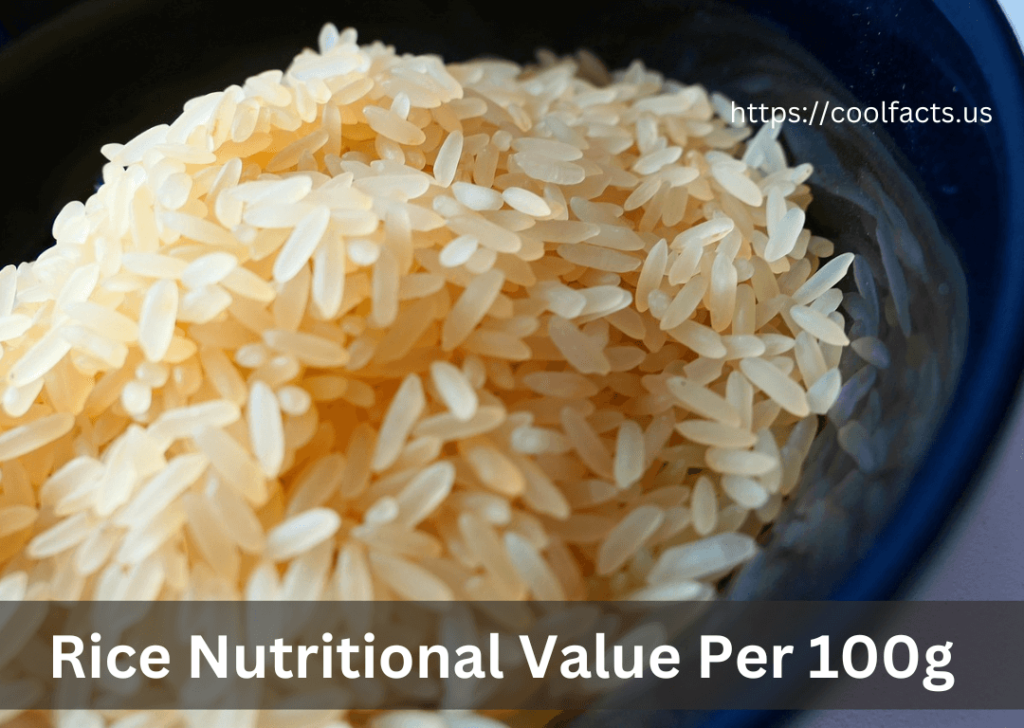In the realm of nutrition, few staples hold as much significance as rice. Not only is it a dietary cornerstone for millions worldwide, but its nutritional profile per 100g serves as a testament to its wholesome goodness. Let’s delve into the depths of rice’s nutritional value and uncover why it deserves a prime spot on your plate.

The Basics: What Makes Rice Nutritious?
Rice is a grain harvested from the Oryza sativa or Oryza glaber rima plants. Primarily composed of carbohydrates, it also packs a punch with essential nutrients vital for optimal health. When examining its nutritional content per 100g, rice reveals a treasure trove of vitamins, minerals, and macronutrients crucial for sustaining life.
Macronutrient Breakdown: Fuel for Your Body
Carbohydrates: The Energy Source
Carbohydrates reign supreme in rice, constituting the bulk of its nutritional value. A 100g serving of rice typically contains around 28-30 grams of carbohydrates, predominantly in the form of starch. As the body’s preferred energy source, carbohydrates from rice provide the fuel needed for daily activities and bodily functions.
Protein: Building Blocks for Growth and Repair
Contrary to popular belief, rice isn’t just a carbohydrate powerhouse; it also boasts a modest amount of protein. While the protein content varies depending on the rice variety, it generally ranges from 2-3 grams per 100g serving. Although not as abundant as in animal-based foods, rice protein plays a crucial role in muscle repair and growth, making it a valuable addition to vegetarian and vegan diets.
Fat: The Essential Macronutrient
Rice is naturally low in fat, with negligible amounts present in a 100g serving. This characteristic makes it an excellent choice for individuals seeking low-fat dietary options without compromising on taste or satiety.
Micronutrient Marvels: Essential Vitamins and Minerals
Iron: Vital for Oxygen Transport
Iron deficiency is a prevalent nutritional concern worldwide, but incorporating rice into your diet can help mitigate this risk. A 100g serving of rice typically contains approximately 0.5-0.7 milligrams of iron, contributing to the body’s ability to transport oxygen and support overall vitality.
B Vitamins: Nourishing the Body and Mind
Rice serves as a rich source of various B vitamins, including thiamine (B1), niacin (B3), and folate (B9). These vitamins play pivotal roles in energy metabolism, nerve function, and DNA synthesis, ensuring the body operates at peak performance.
Selenium: A Powerful Antioxidant
Selenium, although required in trace amounts, is essential for antioxidant defence mechanisms in the body. Rice contains small but meaningful quantities of selenium, safeguarding cells from oxidative damage and promoting overall well-being.
Fiber: Promoting Digestive Health
While predominantly composed of carbohydrates, rice also contains a notable amount of fibre. Although the fibre content varies between white and brown rice, both varieties contribute to digestive health by promoting regularity and supporting a diverse gut microbiome.
Conclusion: Embracing Rice as a Nutritional Powerhouse
In conclusion, rice stands tall as a nutritional powerhouse, offering a myriad of essential nutrients per 100g serving. From carbohydrates fueling your energy needs to micronutrients nourishing your body and mind, rice proves its worth as a dietary staple. Whether steamed, fried, or in a comforting bowl of soup, rice deserves a revered place on your plate for its unparalleled nutritional value and culinary versatility. So, the next time you savour a mouthful of rice, remember the nutritional marvel it brings to your table.